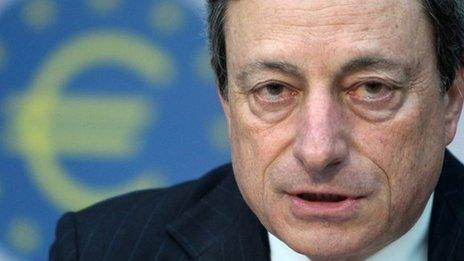The Bank's big day
- Published

Markets have been waiting to hear how - and if - the European Central Bank will intervene
When the Governing Council of the European Central Bank meets on Thursday, the bankers will know that many regard it as the most important meeting in the bank's history.
Before Europe embarked on its summer vacation the bank's president, Mario Draghi, promised to do whatever it took to preserve the euro.
There have been many hints since but there has been no clarity and no detail. Even the hints, however, have calmed the markets over the summer.
The expectation is that the ECB will buy short-term government bonds of troubled countries like Spain and Italy and lower their borrowing costs.
If the costs remain high, Spain will struggle to meet its financial commitments and almost certainly would need a general bailout. Rescuing both Italy and Spain would probably be beyond the eurozone's capacity.
ECB intervention, however, will be controversial. It risks breaking its own rules barring it from directly supporting governments.
Economic fundamentals
The ECB's core mission is to preserve price stability in the eurozone. However, the bank maintains that if monetary policy is not working as it should then it can employ "exceptional measures".
The bank argues that a combination of low interest rates and high borrowing costs clearly indicates that the policy is not functioning as intended. Bond prices, they argue, have become detached from the economic fundamentals.
Jorg Asmussen, a German member of the Governing Council, says that "markets are pricing in the risk of a collapse of the eurozone". That, in his view, is distorting prices and justifies ECB intervention.
Some - like the president of the German Bundesbank - are unpersuaded by this argument. They believe the high borrowing costs accurately reflect the risk of investing in these countries.
Italian Prime Minister Mario Monti and Spanish PM Mariano Rajoy disagree. They argue that they are fully committed to an austerity programme and to reforming their labour markets. Others say that both countries have embraced important reforms but have yet to deliver. Many of the measures have been watered down and the fear is that if the ECB intervenes the incentive for further reform will disappear.
Important moment
So the ECB chief Mario Draghi may want to make it clear that he will only act if the politicians demonstrate they will do more to reform their economies. So the ECB, mindful of its critics, has been hinting that it will only intervene if the country in question has requested help from the eurozone's main bail-out fund and accepted a programme of conditions in exchange.
The Spanish government objects to this. It insists it has already signed up to tough conditions but the ECB may want it to go further to justify buying its bonds.
But this is where the critics come back in. They will want to know who will judge whether countries are abiding by these undertakings. And if a country is considered to be easing off on reforms, what does the bank do then? If it stops buying the bonds, the borrowing costs shoot up again. It is why the critics say the ECB is "on a very dangerous path".
Some argue that such a step would signify a fundamental change in the way the bank operates. It was constructed in the image of the German Bundesbank with a mission to fight inflation. Now, it risks printing money on behalf of the so-called Club Med countries.
So this meeting will be an important moment in the eurozone crisis. If the ECB takes no decision then the markets will show their disapproval.
If the bank promises to support troubled countries then everything depends on the conditions. Spain is close to being unable to fund itself and customers are withdrawing deposits.
Will Mario Draghi provide few details of his plans, so pushing Spain to ask for help, knowing tough conditions will be attached? Will Europe's leaders, weary with fighting a crisis that belies solution, cross a line into pushing its bank to support troubled governments and so weaken its independence?
The markets will also be watching to see if the ECB lowers its interest rate to 0.5%, a new record low but the main scrutiny will be on Mario Draghi's words and his intentions.